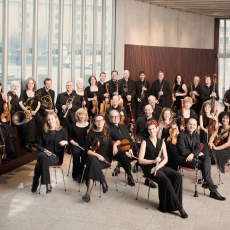Ingrid Fliter - Scottish Chamber Orchestra - Chopin: Piano Concertos - International Record Review
The Chopin concertos are, in many respects, more freighted with tradition than similar works by, say, Mendelssohn or Liszt, or perhaps even Schumann. Historically they have been much recorded by nearly every Chopin player of repute. Generations of received wisdom complicate the soloist's search for fresh interpretative choices, as opposed to the obvious ones. Other factors conspire to challenge musicians seeking fresh paths. Chopin's long tuttis make strenuous demands on the string players, not unlike those famous instances in the finale of Schubert's ‘Great' C major Symphony or the opening of the Bruckner Te Deum. Long held notes and passages of repeated notes fatigue the players to the point of discomfort. The result[ing] physical stress makes it difficult to focus the sort of acute, attentive listening that Chopin requires to his orchestra in order to follow the soloist. Special demands are also made on the conductor, who must draw from his players an unusual type of enveloping yet transparent sound, while maintaining the utmost pliancy of ensemble.
Consequently, putting a strong personal stamp on these beautiful pieces is not an easy task. It has been accomplished, however, and with great daring, on this new SACD recording from Linn, by the Argentinian pianist Ingrid Fliter with the Scottish Chamber Orchestra under Jun Märkl. Pieces we all thought we knew inside out are here presented in a remarkably new light.
Märkl, whose star is deservedly on the rise, is a full partner in the enterprise. He is not only a hypersensitive accompanist par excellence but able to capture something of the heroic rebelliousness permeating the Zeitgeist of these works. Both these concertos, it will be remembered, were written within a year or so of the Rising of 1830, during a period of fulminating Polish resentment of the government of Tsar Nicholas I. These performances seem characteristically imbued with a militant air of Polish Hauteur.
The number of Scottish Chamber Orchestra players is limited to 40 (strings 8/6/4/4/2, double winds and trumpets, four horns, trombone and timpani). This is two fewer than comprised the historical-instrument Orchestra of the Eighteenth Century, led by Frans Brüggen in the Warsaw Chopin Bicentennial Concert in February 2010 (available on Glossa DVD GVD921114), even though they were accompanying an 1849 Érard. (On this recording, Fliter uses a modern Steinway.)
Smaller forces are key to the recordings success, both for balances and for the greater flexibility for ensemble. It is worth recalling that the arrangements of both concertos for piano quartet and piano quintet were published almost simultaneously when the full orchestral versions first appeared.
Märkl encourages an unusually rich use of string portamento; upper wind and brass are especially crisp and articulate. (I mention with some embarrassment that more than one of my colleagues writing elsewhere have waxed poetic over the horn solos when they almost certainly meant to praise the extended bassoon obbligatos of Peter Whelan, whose expressive playing is one of the CD's delights.) The horns are excellent as well, but credit is best restored where due.
Chopin's orchestrations derive from Mozart's concertos rather than from the heroic contests between soloist and orchestra of the Beethoven tradition. Here the orchestra fulfils it role of supportive amplification superbly. Most tellingly, Fliter's subtlest stretches and contractions of tempo are matched in perfect sympathy by Märkl and his players.
Filter's realization of Chopin's fioriture has been equalled by few other pianists and surpassed by none. Harmonic movement is the compass for her thorough understanding of Chopin's ineffable tempo rubato: natural, always expressive, yet never crossing the line into the maudlin or saccharine. Around this firm, Fliter casts a gossamer web of florid ornamentation that only heightens rhetorical eloquence. It is as though we hear Chopin's musical argument delivered with all the implacable directness of a great singing-actress. Both slow movements achieve a refinement of utterance better experienced than described.
Suffice it to say that, in the Op. 11 Romanze, the shimmering sensuous melody seems to emerge thread-like from within a blossom of right-hand arpeggiation. In the Op. 21 Larghetto, that unique musical moment characterized by Liszt as ‘the perfection of an ideal', Fliter halts time itself, as if parting a curtain to reveal the star-strewn night sky. Transitional cadenzas, in the slow movements as well as in the lively ones, are of a magical delicacy. Folk elements - the krakowiak in the Rondo of the E minor Concerto and the mazurka in the finale of the F minor - are vivid, lilting, natural. The only thing they miss is any trace of eccentricity or ostentation. The codas of both finales seem to jump for joy. I can't think of anyone, not Hoffmann, not Rubinstein, not Novaes - who pulls them off with greater élan. The admirable part of it all is that the justification for everything Fliter does, every nuance and detail, is right there in the score. Somehow she has managed to discern and internalize Chopin's message to the extent that what she imparts sounds unmistakably authentic and entirely new.



